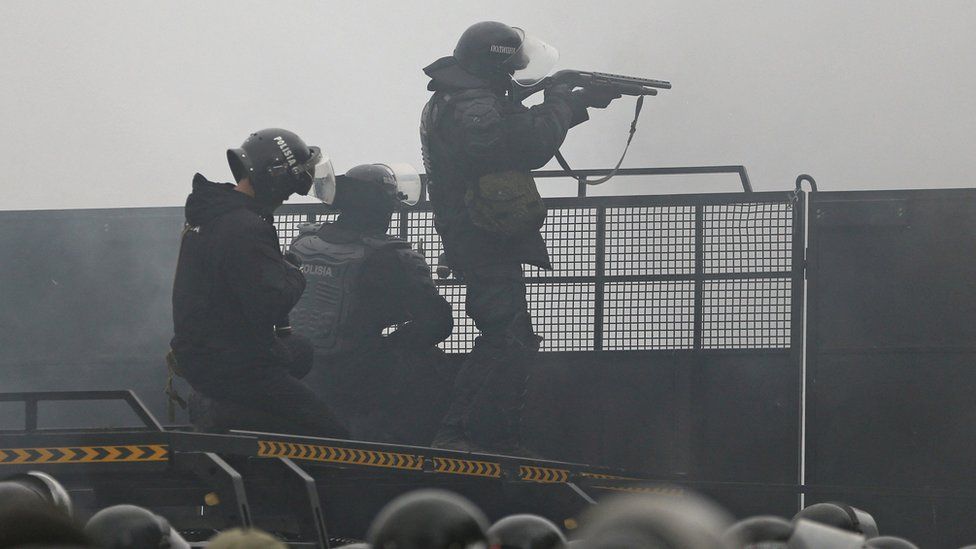Demonstrations sparked by rising fuel prices escalate, despite a state of emergency in some areas.

Image source, Reuters
Staff at Kazakhstan’s main airport have had to flee after anti-government demonstrators entered the terminal.
The arrival of protesters at the airport in the country’s biggest city, Almaty, on Wednesday marked an escalation of the nationwide unrest.
The protests were sparked by rising fuel prices, but they have broadened to include other political grievances.
At least eight security force members have been killed, the government said, while hundreds more have been injured.
A state of emergency has been declared as the government tries to regain control.
President Kassym-Jomart Tokayev has promised a tough response to the demonstrations, calling them a “black period” in the country’s history. He accused protesters of being “plotters” who were “financially motivated”.
However, Kate Mallinson, an expert on Central Asia at the foreign affairs think tank Chatham House in London, said the protests are “symptomatic of very deep-seated and simmering anger and resentment at the failure of the Kazhak government to modernise their country and introduce reforms that impact people at all levels”.
Mr Tokayev is only the second person to lead the former Soviet state since it declared independence in 1991. His election, in 2019, was condemned by the Organization for Security and Co-operation in Europe (OSCE) as showing scant respect for democratic standards.
- BACKGROUND: Kazakhstan country profile
- CONTEXT: Rare protests in a country that bans dissent
Much of the anger on the streets, however, seems to have been aimed at his predecessor, Nursultan Nazarbayev, who has held a powerful national security role since stepping down. On Wednesday, he was fired in an attempt to quell the growing unrest.
Protesters had been heard chanting Mr Nazarbayev’s name, while a video showing people attempting to pull down a giant bronze statue of the former leader has been shared online. According to BBC Monitoring, the now-dismantled monument appears to have stood in Taldykorgan, Mr Nazarbayev’s home region.
Earlier, in Almaty, protesters gathered at the mayor’s office before eventually storming it. Videos on social media showed a plume of smoke rising from the building, while gunfire could also be heard.
The city’s police chief, Kanat Taimerdenov, said “extremists and radicals” had attacked 500 civilians and ransacked hundreds of businesses.
Water cannon was used against protesters in the western city of Aktobe. There are reports that security forces have sided with protesters in some places.
However, getting a clear picture of what is happening in the central Asian nation is proving difficult. The interior ministry released figures for casualties among the security forces, but there were no equivalent reports of any injuries or deaths among protesters.
Internet services in the country have also been disrupted since Tuesday. By Wednesday, internet monitoring group NetBlocks reported that Kazakhstan was “in the midst of a nation-scale internet blackout”.
A nationwide state of emergency – imposing an overnight curfew, restricting movements and banning mass gatherings – is set to come into force on Wednesday evening.
Other attempts to end the protests, which began on Sunday when the government lifted the price cap on liquefied petroleum gas which many people use to power their cars, causing it to double in cost, have been made.
As well as Mr Nazarbayev’s dismissal, the entire government has resigned.
President Tokayev has also appealed for help from a Russian-led security bloc to deal with what he described as a “terrorist threat”.

Protests are not only about fuel
by Olga Ivshina, BBC Russian
The speed at which the protests turned violent took many by surprise, both in Kazakhstan and in the wider region, and hinted that they are not only about an increase in fuel prices.
This is a traditionally stable Central Asian state, which is often described as authoritarian. Until 2019 it was run by President Nursultan Nazarbayev, whose rule was marked by elements of a personality cult, with his statues erected across the country and a capital renamed after him.
Yet when he left, it was amid anti-government protests which he sought to limit by stepping down and putting a close ally in his place.
Most elections in Kazakhstan are won by the ruling party with nearly 100% of the vote and there is no effective political opposition.
The analysts I spoke to say that the Kazakh government clearly underestimated how angry the population was, and that these protests were not surprising in a country with no electoral democracy – people need to take to the streets to be heard.
And their grievances are almost certainly about a far wider set of issues than the price of fuel.

This video can not be played